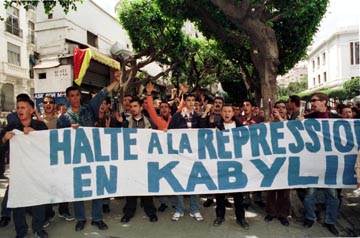


|
|
May 3 march in Algiers, capital of Algeria, the scene of several recent mass protests. Sign reads: "Stop the repression in Kabylia."
|
The mobilization comes on the heels of weeks of demonstrations involving tens of thousands who have faced police repression. Up to 80 people have been killed by the police over the course of a week of protests in Kabylia. Widespread demonstrations were sparked by the April 18 death of Guermah Massinissa, known as Moumouh, an 18-year-old Berber high school student. Massinissa was killed while in a police station in the Beni-Douala district of Tizi Ouzou.
The May 21 outpouring was organized by a coordinating committee representing Berber village committees that was formed May 17 in the town of Illoula. Berbers, an oppressed nationality in Algeria, comprise 30 percent of Algeria's 30 million people.
Tizi Ouzou, the capital of the Kabylia region, is located about 70 miles from Algiers, the capital of Algeria.
The protest was the largest action against the military regime in 10 years, and the largest in the history of Kabylia. The Berber Cultural Movement , the Autonomous Students Committee of Algiers, Tizi Ouzou high school students, and the Front of Socialist Forces have organized protests over the past month as well. Thousands of people mobilized in the capital of Algeria May 3 to condemn police violence and repression in Kabylia.
The protest also demanded jobs, better housing, and steps to end the rising impoverishment of growing layers of workers and farmers. The action, which organizers said drew 25,000, was sponsored by the main opposition party in Kabylia, the Socialist Forces Front.
Prior to the start of the demonstration, some 3,000 students, according to witnesses, also marched. They chanted "government, murderers, gendarmes, criminals" in Arabic and in French.
The May 5 Economist noted, "The streets of the two regional capitals, Tizi Ouzou and Bejaia, turned into battle zones as young men clashed with the riot police. In towns and villages throughout the region, protesters attacked and destroyed government buildings and tried to overrun police stations." Barricades were set up on the roads linking Tizi Ouzou to Algiers.
In the days following the massive action in Tizi Ouzou, radio reports and news wire stories indicate that protests are continuing by students, youth, women, and journalists throughout the region and in Algiers. "Sporadic clashes erupted between youthful protesters and police in numerous small towns around Algeria's tense Berber region," the Dow Jones news wire reported May 23, "with several dozen demonstrators injured over the past 48 hours." Radio Beur FM, a Paris-based station, announced a demonstration of 5,000 students the same day in Algiers and a protest of 10,000 women in Tizi Ouzou. The actions all focused on denouncing the massacres of youth by the gendarmes. Algerian state television reported the construction of road barricades of trees and burning tires in the villages of El Kseur and Bakaro.
Also on May 23, some 50 journalists, joined by 400 others, organized a silent march to protest government attacks on freedom of the press. They wore tape over their mouths as they marched.
The demonstrators have raised the demand for recognition of Tamazight, the Berber language, lifting of restrictions on the press, and postponement of final examinations for secondary school students, who have been occupied with protests for the past month, until September. The government postponed the exams for two weeks, which the Berber Cultural Movement rejected.
A civil war has been widening and deepening in Algeria since 1992. In December 1991 the French government prodded the regime in Algiers to annul the results of the national elections won by the Islamic Salvation Front, citing the danger of the "Islamic fundamentalism" of opposition groups, and to establish a military junta. The ensuing war has resulted in the deaths of 100,000 people.
Unemployment in Algeria is about 30 percent, and the country owes $30 billion--nearly two-thirds of its annual Gross Domestic Product--to banks in the imperialist centers.
The ruling party, the National Liberation Front, bears the same name as the party that led the successful battle for independence from France, which had as many as 500,000 troops occupying the country from 1954 to 1962. By 1963 a workers and farmers government had been established under the leadership of Ahmed Ben Bella, which existed until 1965, when Ben Bella was overthrown by a military coup led by Houari Boumedienne.
Under the pressure of the mass protests, the government of President Abdel Aziz Bouteflika has set up commissions to investigate the deaths of protesters, which the government puts at around 40 but Berber sources say is closer to 80. The leadership body of village committees has called for a boycott of these commissions.
The coordinating committee has also called for a boycott of all government-sponsored ceremonies and sporting events.
Front page (for this issue) |
Home |
Text-version home